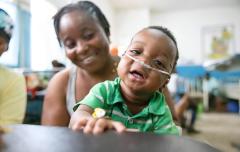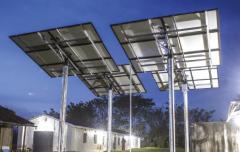Seven for 7: Celebrating innovation in energy for health
NEW YORK CITY – Seven global leaders in the sustainable energy movement were honored tonight at Seven for 7 – a celebration by Sustainable Energy for All (SEforALL), in partnership with Ashden. The individuals and organizations were recognized for leading and driving action on Sustainable Development Goal 7 (SDG7), the call for universal access to affordable, reliable, sustainable and modern energy for all by 2030.
Following the success of the inaugural Seven for 7 celebration in 2018, this year's event looked at the nexus of energy and health, putting a spotlight on personalities and initiatives that made significant progress in the areas of cooling for all, powering health care, clean fuels for all and outdoor air quality.
Watch the event here
The celebration, hosted at the Ford Foundation Center for Social Justice, took place in the week of the critically important 2019 Climate Action Summit and one day after a high-level meeting on universal health coverage at the United Nations General Assembly.
The seven honorees included political leaders, city governments and businesses that are improving lives globally and locally. They are leading and driving action in Ghana, India and Mexico, and in cities as diverse as New York, Medellín and Ahmedabad.
“Energy for all is not just about providing electrons; it is about ensuring all the other things we depend upon can be provided reliably,” said Rachel Kyte, CEO and Special Representative of the UN Secretary-General for Sustainable Energy for All.
“This year’s Seven for 7 honorees show innovation in energy for health that can be scaled. Their leadership is lighting up delivery rooms for pregnant women, powering critical medical equipment and ensuring clinics can preserve life-saving vaccines for newborns, children and adults.”
Find out more from the event by following #Sevenfor7 on social media.
The Seven for 7 honorees of 2019 are:
H.E. Hajia Samira Bawumia
Samira Bawumia is the Second Lady of the Republic of Ghana. By leveraging her position of influence, she works relentlessly to improve the lives of women, children and the youth.
As the founder and CEO of Samira Empowerment and Humanitarian Projects (SEHP) she provides critical interventions in the areas of health, education and women’s empowerment. The organization aims to reduce the high rates of maternal and child mortality in the country by distributing birth kits to underprivileged expectant mothers and by providing medical equipment and pharmaceuticals to selected health facilities across Ghana. This is improving the lives of about two million people.
In Ghana, eight out of ten people cook with solid fuels such as wood and charcoal, leading to significant impacts on health, gender equality and the environment. The toxic emissions from cooking this way lead to about 18,000 premature deaths per year. As an Ambassador for the Clean Cooking Alliance, Samira Bawumia is promoting the adoption of clean cooking stoves and fuels in her country, in Africa and across the world.
Sistema.bio
Around the world, more people are killed by illnesses related to indoor air pollution than AIDS and Malaria put together - with polluting cookstoves and open cooking fires a major danger. Biogas provides a healthier and more affordable cooking fuel.
Sistema.bio has created an innovative, affordable biogas system that turns animal waste into clean cooking fuels and produces a planet-friendly fertilizer.
The product's simple, modular design makes it easy to add more capacity if needed, and the option to pay in installments makes it available to farmers. Buyers in Latin America, Africa and Asia no longer must cook using expensive and polluting wood fuel or fossil fuels, reducing deforestation and greenhouse gas emissions.
Sistema.bio currently operates in Mexico, Colombia, Nicaragua, Kenya and India. Until now, more than 7,000 biogas systems have been installed – improving the health of thousands of families, saving 1.5 million of trees and mitigating more than 100,000 tons of CO2.
Winner of the 2019 Ashden Award for Clean Cooking
Chhattisgarh State Renewable Energy Development Agency (CREDA)
Primary Health Centers (PHCs) are the foundation of rural healthcare in India. Although the quality of healthcare improves with access to electricity, one in two health centers in India is either un-electrified or suffers from an irregular power supply (CEEW & Oxfam, 2017).
Before CREDA decided to tackle this, the situation in Chhattisgarh state in the center-east of India (population: 25.5 million) was no different. Most PHCs had no reliable source of power, partly because the state is heavily forested, and this makes grid extension difficult.
The Chhattisgarh State Health Department collaborated with CREDA on a program to provide solar power at all PHCs. After the installation, CREDA contracts installation companies to carry out maintenance for five years. After that, the systems installed in government-owned health centers are maintained by CREDA, which monitors the monthly performance of all systems.
Access to regular electricity has enabled reliable water supply, safe refrigeration for vaccines and powered theatre equipment, fans and baby heaters. Now, about 80,000 patients per day benefit from the solar electrification of 900 health centers and district hospitals.
Winner of the 2018 International Ashden Award for Sustainable Energy and Health
Philips Community Life Centers
In Sub-Saharan Africa, four in ten people have no access to healthcare facilities or personnel, and for those who do, the quality of services is often low. Challenges include a lack of qualified healthcare workers, non-functioning medical equipment, a lack of electricity, water and basic healthcare technology.
Community Life Centers (CLC), developed by Philips Africa Innovation hub, are community-driven and holistic platforms for strengthening primary healthcare, combining renewable energy, energy efficient design and locally relevant medical devices. The centers provide solar power units, water storage containers, LED area lighting to improve the safety of the community as well as solutions for waste management.
In addition, the CLCs can offer a wide range of clinical and medical device training to help improve competencies. Combined with service offerings for maintenance and repair the CLCs help ensure an improvement in quality, readiness and responsiveness of the facility which is so often lacking.
Philips launched Africa's first Community Life Center in GithuraiLang'ata, Kenya aimed at strengthening primary healthcare and enabling community health development. Other centers have been set up in South Africa, Namibia and DR Congo, with plans to deploy these centers across the African continent.
Medellín Green Corridors Project
After enduring years of high crime and violence, Medellín, Colombia's second-largest city (population: 2.5 million) faces a new threat – rising urban temperatures, driven by climate change. The city's response has been to bring people together to plant vegetation and create a better environment for everyone.
The Green Corridors project provides shade for cyclists and pedestrians, cool built-up areas and improved air quality along busy roads. The city's botanical gardens train people from disadvantaged backgrounds to become city gardeners and planting technicians.
So far, Medellín has created parks and alleys along 18 roads and 12 waterways, planting 8,300 trees and 350,000 shrubs. As a result, temperatures have fallen by two or three degrees Celsius in many places, with more significant reductions expected in the future.
Winner of the 2019 Ashden Award for Cooling by Nature
Ahmedabad Heat Action Plan
With 6.4 million people, Ahmedabad in western India is the seventh-largest urban area in India. When in May 2010 over 1,300 people died in a heatwave, the municipal council decided to act. Ahmedabad was the first city in South Asia to design and implement a heat action plan. This was done in coordination with the Indian Institute of Public Health, the US-based Natural Resources Defense Council, and other groups and NGOs.
The plan's primary objective is to alert those populations most at risk of heat-related illness that extreme heat conditions either exist or are imminent. An early warning system is being used during heat waves, accompanied by a public education campaign about how to avoid harm from excessive heat.
Since the plan was launched in 2013, more activities were added, such as the greater use of cool roofs and training for medical professionals to identify and treat victims of extreme heat.
Ahmedabad not only saved thousands of lives, but it also led the way for many other Indian cities as 30 cities in 11 states have now adopted similar plans.
NYC CoolRoofs Initiative
Like many other cities in the world, New York City experiences hot summers during which asphalt roads and concrete buildings store the heat and increase the ambient temperature.
NYC CoolRoofs is a collaboration between the NYC Department of Small Business Services, the Mayor’s Office of Sustainability, the Mayor’s Office of Resiliency and Sustainable South Bronx, a division of The HOPE Program to promote and facilitate the cooling of New York City's rooftops.
The initiative also provides local job seekers with training and paid work experience coating these rooftops. The NYC CoolRoofs initiative achieves several goals: lowering indoor temperatures by installing energy-saving reflective rooftops, providing local job seekers with training and work experience, and keeping neighborhoods cooler by installing clusters of reflective rooftops.
Installations are provided at no-cost to nonprofits, affordable housing, select cooperatively-owned housing and select organizations providing public, cultural, or community services. Privately-owned buildings can receive installations at minimal cost. The program also supports the city's goal of achieving carbon neutrality by 2050, because it helps decrease the summertime peak energy demand for cooling. Since 2009, the program has coated more than 10 million square feet of rooftops throughout the city.
Related content

News
09 Oct 2019

Programme

Research
24 Apr 2019

News
16 Jul 2019
